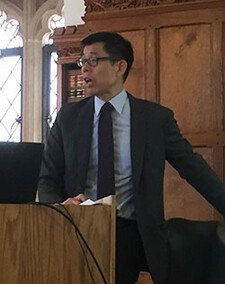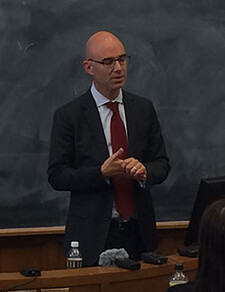Lectures on Cybersecurity in the U.S. and China
As part of its ongoing engagement with China on issues of cyberspace and technology policy, and looking forward to the Conference on Cyberspace and U.S.-China Relations to be held in April, the Paul Tsai China Center hosted two talks featuring experts on the subject in recent months.

Cheng, who served as a federal prosecutor for more than 20 years and was one of the first resident legal advisors in the U.S. Embassy in Beijing, said cybercrime extends beyond the high-profile stories of economic espionage and includes threats to organizations from current or former employees, politically motivated “hacktivism,” and criminal enterprises through which even loosely associated individuals connect online to engage in crimes.
U.S. efforts to address cybercrime with a nexus to China have stretched over many years, and the legal and political approaches to addressing such crimes vary widely according to the case, Cheng said. Both through traditional measures, such as mutual legal assistance procedures, and through specific U.S.-China mechanisms, U.S. and Chinese authorities have had some successful cooperation, but the complexity of cross-border work and the differences between legal systems create significant challenges.
Online fraud within China, Cheng said, poses special challenges to Chinese authorities in part because China is a market where mobile phone–based transactions create new opportunities for criminals.
Cheng published a commentary March 9 on the Lawfare blog, in cooperation with the Paul Tsai China Center, entitled “Prospects for U.S.-China Cybercrime Cooperation: The Road Thus Far.”

Segal described both greater cybersecurity vulnerabilities and the race for greater power in cyberspace among China, the United States, and other countries.
The United States and China, Segal said, have made progress in efforts to develop cybersecurity and technology policy dialogue, but significant differences remain. He argued that there is no way to square the circle of China’s official emphasis on Internet sovereignty and longstanding U.S. preferences for openness online.
Segal concluded that in both economic and security affairs the United States and China have some common interests. Economically, both countries are home to large companies that share interests in global, transparent standards across the world market, but techno-nationalism in many countries creates persistent challenges. In the security realm, both countries would benefit from protecting critical infrastructure and preventing proliferation of cyber weapons to non-state actors, but the current dialogue mechanisms on these matters are not enough.
Segal’s latest book, “The Hacked World Order: How Nations Fight, Trade, Maneuver, and Manipulate in the Digital Age,” was published in 2016 by PublicAffairs.
The Paul Tsai China Center will be holding the Conference on Cyberspace and U.S.-China Relations on April 12, 2017. The main organizer is Graham Webster, a Senior Fellow of the Paul Tsai China Center.


